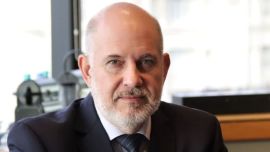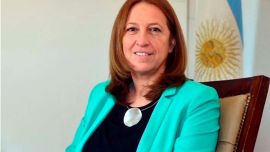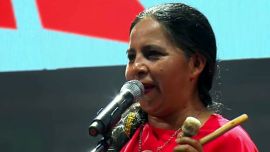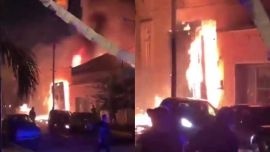President Alberto Fernández on Friday announced a three-week extension of restrictions to tackle the Covid-19 second wave, warning the nation that the “next few weeks maybe be very hard.”
The Peronist leader confirmed that the existing 8pm-6am nighttime curfew in the Buenos Aires metropolitan area (AMBA) and other at-risk regions would remain in place and, controversially, the cancellation of in-person classes at schools in and around the nation’s capital.
"The measures are showing good results, but the situation is not resolved: the number of cases is really high. The epidemiological situation in the metropolitan area of Buenos Aires is critical and we have other areas with high health concerns," said Fernandez in a pre-recorded message released to the media.
"We must make a new effort to lower circulation, reduce infections and thus decompress our health system as much as possible. For the country as a whole, the same measures that are currently in force will be maintained until May 21,” he said.
Argentina has recorded more than 63,000 deaths from Covid-19 to date, with its tally of confirmed cases on track to surpass three million over the weekend. For the past 10 days, the country has regularly recorded more than 20,000 cases every 24 hours.
“Due to the infections that we already had and those that currently exist, the next few weeks may be very hard for the occupation of intensive therapy beds,” said Fernandez, sounding the alarm over Argentina’s health system, which is coming under increasing strain.
More than 5,300 patients with Covid-19 were hospitalised in intensive care units across the country as of Friday morning, with bed occupancy at 68.4 percent nationwide and 76.6 percent in the AMBA region.
Education row
With primary and midterm elections due to take place before the end of the year, Fernandez finds himself under increasing pressure over his handling of the pandemic.
Progress in acquiring the necessary vaccines for Argentina’s inoculation programme against Covid-19 has been slow, while the lengthy and strict lockdown imposed to tackle the coronavirus pandemic last year has seen the economy wither.
Over the past two weeks, tensions between the national and Buenos Aires City governments have risen over the cancellation of in-person classes. The president’s decision to extend closures will undoubtedly prompt renewed pushback from Mayor Horacio Rodríguez Larreta, who has sought to keep students in schools and resist the measure.
The opposition leader has taken his case to the Supreme Court, arguing that City Hall has autonomy to decide on if schools should be open, though the nation’s highest tribunal has yet to issue a definitive ruling, despite expectations it would do so this week. In the meantime in-person schooling has continued.
In a nod to the clash, Fernandez said in Friday’s speech that he would be sending a bill to Congress to give him and state governors greater power to enforce infection-control measures, under the framework of the Covid-19 health emergency.
"The measures against the pandemic are strictly to save lives. The rules we put in place must be complied with equally by all," the president said.
"In more than 20 provinces there are face-to-face classes. For us, education is a priority. Remote classes are only taught where the pandemic requires it," he argued.
Fernandez said schools in the AMBA region would teach classes “exclusively at a distance” until May 21, despite talks with City Hall officials earlier in the week exploring the possibility of moving secondary schooling online and continuing with in person-classes for students at infant and primary education levels.
"We know the difficulties that this poses to children and families, but it is a necessary measure to reduce circulation,” said the Peronist leader, who remarked that he had “worked tirelessly to build dialogues and agreements” since the beginning of the pandemic.
In a clear message to the City mayor, he said “all of us need to work together.”
The president also announced that shops, bars and restaurants would only be able to remain open until 7pm, except for gastronomic establishments that offer delivery services and said tougher limits would be placed on outdoor gatherings, with gatherings in outdoor public spaces limited to 10 people. He called on citizens to refrain from meeting in their homes with others to limit the changes of contagion and said casinos and nightclubs would be banned from operating.
Cultural, social, recreational and religious events – including cinemas, theatres and gyms – will be able to open at 30 percent capacity.
Fernandez said that the measures were an attempt to buy time for the health system and to ensure that all Argentines received the treatment they need.
To date, the government has taken delivery of more than 10 million Covid-19 vaccines, with doses supplied by a number of different laboratories. The country has to date given at least one vaccine dose to 7.86 million people.
The immunisation of at-risk groups continues, though the president said that 95 percent of all healthcare workers had now received a shot.
Ther president also announced he would boost economic assistance with an injection of some 300 billion pesos (US$3 million), with payments for the retired, economically damaged sectors of the economy and universal child allowance planned.
Argentina, which has been in recession since 2018 and suffers from runaway inflation, saw GDP contract by 9.9 percent last year amid the pandemic. Poverty has risen to 42 percent and unemployment is at 11 percent.
Health Ministry freezes price of medicinal oxygen
The Health Ministry announced Thursday that it would freeze the price of medicinal oxygen for 90 days, while instructing liquid oxygen producers to proritise the health system.
"All liquid oxygen producers are obliged to allocate supplies to the health sector,” read a Health Ministry resolution published in the Official Gazette.
The resolution also suspended any increase in the prices of medical oxygen for 90 days because "in a context of growing demand, changes have been reported in the prices of drugs, supplies and, in particular, of liquid medical oxygen in bulk or in tubes."
– TIMES/AFP/NA




















Comments